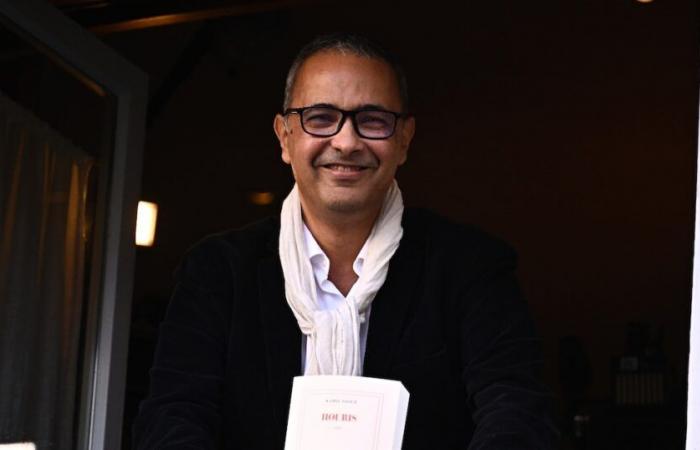At midday forty, Philippe Claudel, the president of the Goncourt jury, descends the stairs of Drouant, Place Gaillon, in Paris. And announces the 122nd Prix Goncourt, won by… Kamel Daoud in the first round by six votes to two for Hélène Gaudy, one for Sandrine Collette and one for Gaël Faye. A few days ago, the rumor was that the “Ten” from Drouant were perfectly divided, five to five for Houris (Gallimard) by Franco-Algerian journalist and writer Kamel Daoud and for Jacaranda (Grasset) by Franco-Rwandan rapper Gaël Faye. We could then have expected a finale as crazy as in 2023 with a Jean-Baptiste Andrea (Watch over her) crowned in the 14th round thanks to the double vote of President Didier Decoin, and only in 2022 with Brigitte Giraud (Live fast) according to an identical scenario. An exciting fight between two French-speaking authors (each having experienced, directly or indirectly, the horrors and massacres of the civil war) published by two major literary publishing houses and whose novels are enjoying great success in bookstores – more than 160 000 copies for Gaël Faye according to Edistat and more than 75,000 for Kamel Daoud (excluding Switzerland, Belgium, Quebec, etc.). But in the meantime, several members of the jury have “changed course” and preferred to crown the courageous native of Mesra, Goncourt Prize for the first novel 2015 for Meursault, counter-investigation.
READ ALSO: The ten stars of the literary season: what to read (or not)
But before going upstairs to the restaurant to “cook” the members of the jury, let's remember that the Goncourts were hot this year. Thanks to a system of alternation with the “Ladies” of Femina which means that everyone awards their prize in turn first and this for a gentleman agreement en 2004, they narrowly escaped the American presidential election this Tuesday which will capture the attention of the entire planet (to the detriment of the Femina awards, therefore). Up there, the atmosphere is calmer than in Washington. No tense smiles or sullen faces, even the supporters of the three eliminated authors put on a good show. It is because everyone recognizes, with one voice, the strength and courage of Houris and its author; everyone, too, applauds the Renaudot prize awarded to Gaël Faye (in the 1st round).
“A book that has breath”
Starting with Pierre Assouline, an early supporter of the Franco-Algerian journalist (he acquired French naturalization in 2020). He fought, he tells us, with Régis Debray so that Kamel Daoud obtained the Goncourt in 2014 for his first novel, Meursault, counter-investigation. “I am very happy because Houris is a great, demanding novel. It's a book that has breath and great power. On this subject, he could not write in a lukewarm manner, he had to do it with harshness and passion.” To the left of Pierre Assouline, Pascal Bruckner, who we know voted for Sandrine Collette, does not hold back of praise too: “I have been following Kamel Daoud since 2015, since he was lynched in The World after the Cologne rape affair for having said that this was a sign of the sexual misery of immigrants, the entire left fell on him by calling him racist. The man is courageous, very fine. With Kamel Daoud, Islam returns as a central issue in politics today through the fate reserved for women. It's a very beautiful day, on all levels, literary, symbolic, political. Literally, it borrows from several genres, chanting, litany, we find all of this in Arabic literature. There are perhaps some chapters that are harder to tackle than others but that is part of the French language. This reminds me of Mohamed Mbougar Sarr, our 2021 laureate, with his beautiful and powerful language.”
READ ALSO: The secrets of the 2024 Goncourt Prize: influence of Gallimard, new president and small psychodramas
Didier Decoin was fascinated, he says, by the incantatory side of his language. “I have the impression of hearing the words of Scheherazade, it's a very good text, I don't know if the public will appreciate it, but it's beautiful. I really liked Sandrine Collette and Olivier Norek too , I think this return to school was very beautiful.” Tahar Ben Jelloun, for his part, a supporter from the start, welcomes the international aura that this book will have and their common fights against Islamism. Camille Laurens, who voted for Hélène Gaudy, says she is very happy with this prize awarded to Kamel Daoud for “a necessary, important book, for the voice it gives to the suffering of women. We can love his lyricism and the emotion that he displays with fullness.” Likewise Christine Angot, who says she fought so that Houris either in the last four and, once assured of her final success with her comrades, wanted to send a tip of the hat to the magnificent Archipelagos by Hélène Gaudy: “She too, in a certain way, is in the unspeakable, and her sentence, extremely delicate and nuanced, is very beautiful. There, it was not possible not to defend Kamel Daoud. a true writer, he is someone who is alone in doing something, his words are beautiful, but not calm, not simple, despite appearances this book is something that is of the order of duty, Kamel Daoud; is someone who cannot not. That said, it was important for me to defend Hélène Gaudy. She is now more than spotted. In short, no matter how much we search, not a single discordant voice comes to hinder the harmony of this Goncourt 2024 jury.
A new print run of 350,000 copies
In the meantime, Kamel Daoud arrived, with Antoine Gallimard, his editor, beaming, in the living room at Drouant. The boss of Gallimard Editions explains, smiling, that “this shows that woman is the memory of man. The only freedom we love is the freedom to create, and what power it is to have been able to create this feminine double.” Before announcing a new print run of 350,000 copies.
READ ALSO: Hélène Gaudy, Edouard Louis, the logbook of “L’Amour ouf”… The 10 books to read in November
One thing is certain, Kamel Daoud will not receive a congratulatory message from the Algerian president unlike Mohamed Mbougar Sarr to whom the Senegalese president had sent a laudatory SMS on the very afternoon of his coronation, on November 3, 2021. Indeed, the author who presents himself as “a child of independence” and pleads for a “right to the truth” concerning the recent history of Algeria, in particular the civil war of the 1990s, is at odds with his country where it is still forbidden to discuss the subject – while Gallimard editions were recently ousted from the Algiers International Book Fair (SILA) most likely due to the publication of Houris. Hourisprecisely, evokes this dark decade of the 1990s pitting “the shady soldiers and the bearded men of God” and causing some 200,000 deaths, a decade that the writer covered as a journalist. The main narrator, Aube, had her throat slit at the age of 5 by Islamists. Miraculously, she became mute and gained a monstrous smile reconstructed by surgeons. Two decades later, pregnant with a little girl (it's a girl, she is convinced), she tells him, over the course of long monologues, her intimate traumas like the demons of an entire nation – the hypocrisy of religious people. , the violence of Islamism.
On the menu for the fresh winner, an invitation the same evening to the show Dailyby Yann Barthès, of which he will be the main guest, and another at the morning of France Inter Tuesday morning. Not so bad in these times of suspenseful American elections.
.
- -





